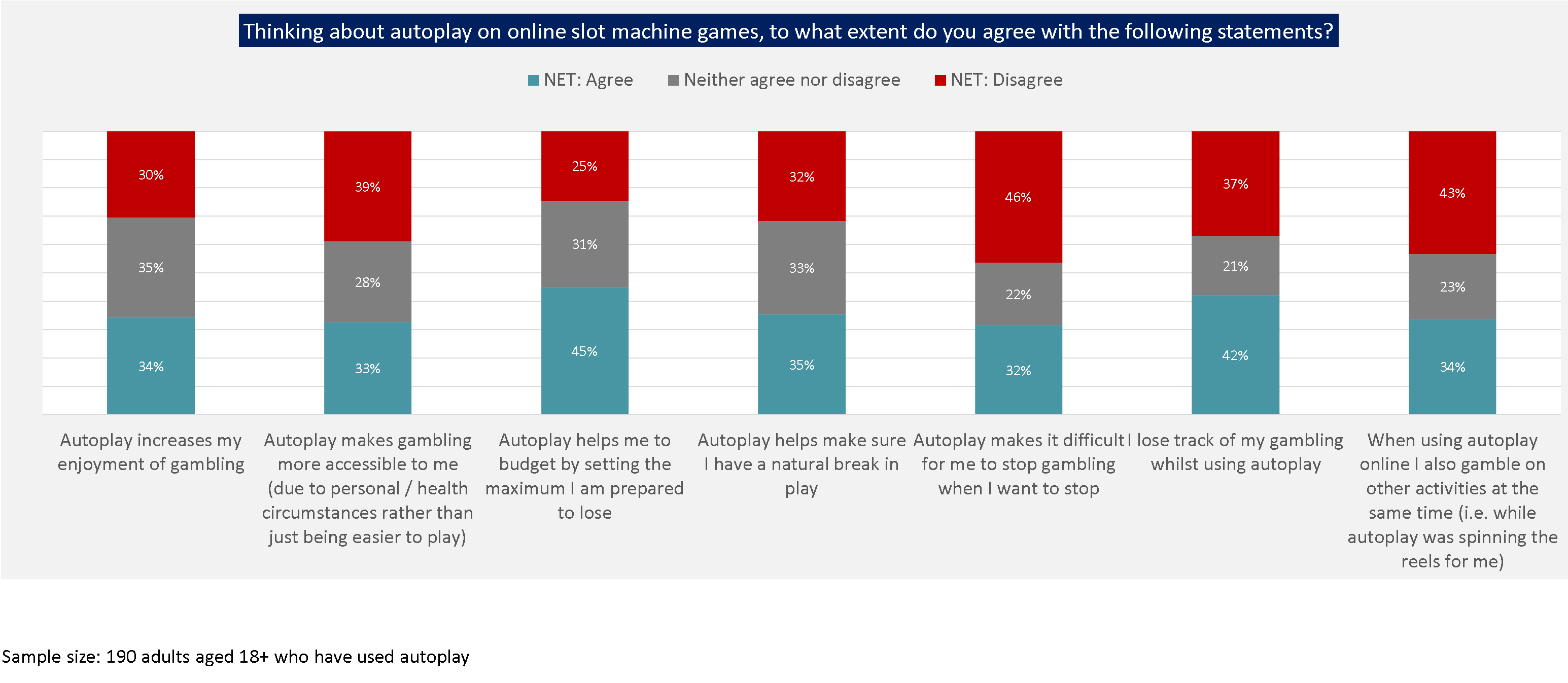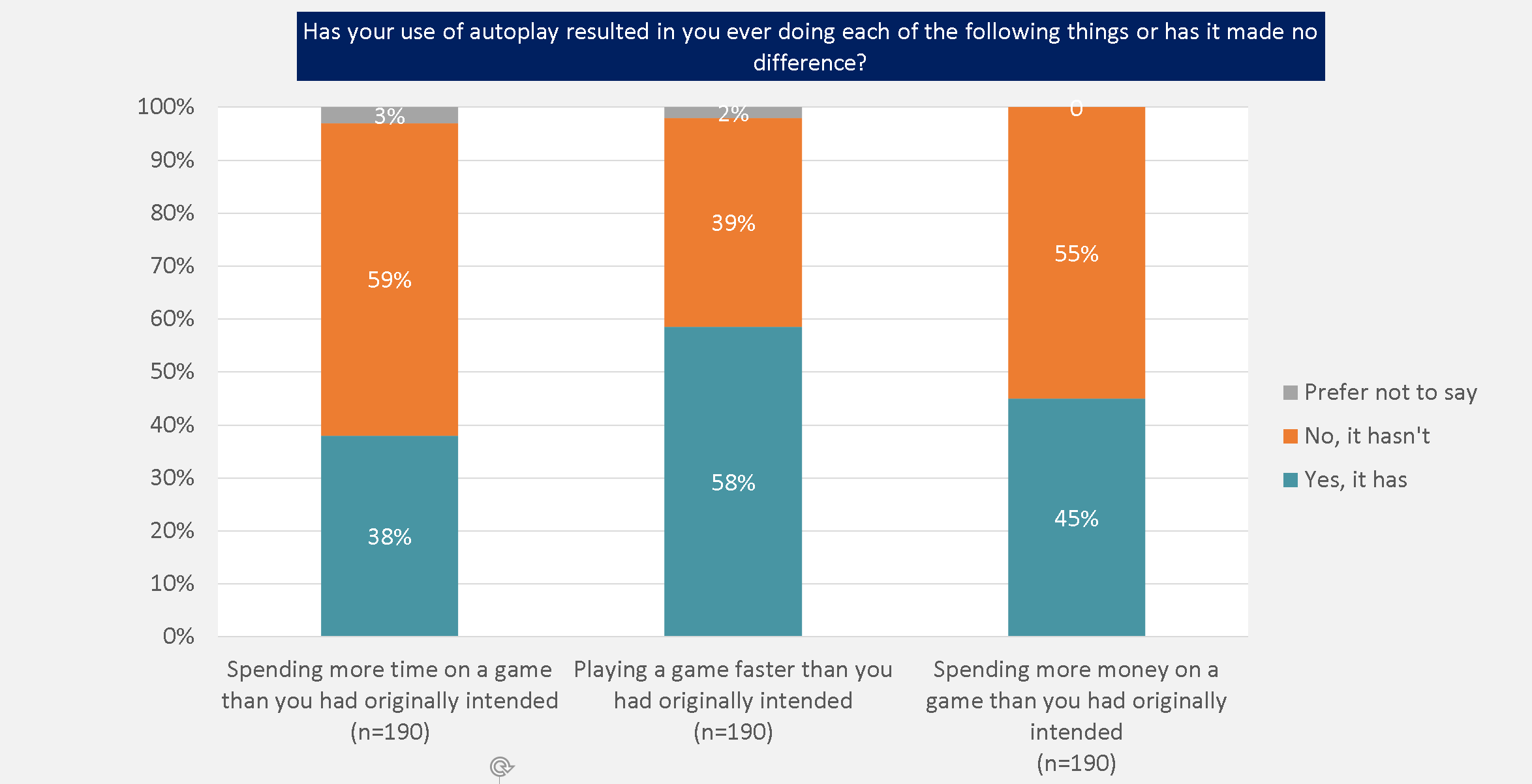Consultation response
Online games design and reverse withdrawals
Consultation response for online games design and reverse withdrawals and proposed changes to the design of online slots.
Contents
- Executive Summary
- Introduction
- Summary of responses
-
- Introduction
- Defining online slots within the Remote Technical Standards
- Prohibiting multiple slot games
- Introducing speed of play limits
- Prohibiting player-led “spin stop” features
- Prohibiting auto-play functionality for online slots
- Prohibiting effects that give the illusion of “false wins”
- Display of net position and time spent
- Evaluation of changes to slots games
- Prohibition of reverse withdrawals for all remote operators
- Testing
- Annex 1 – Summary of changes to RTS
- Annex 2 - Consumer research into auto-play
- Annex 3 – List of consultation responses
Annex 2 - Consumer research into auto-play
Summary of consumer research into auto-play
We inserted a number of questions on autoplay into December’s online tracker (a nationally representative online survey which typically gets 2,000 responses per quarter). Of these responses, 358 were online slots players and of those, 190 respondents indicated that they have used the auto-play feature.
The aim of this research was to test the views of consumers on auto-play, as well as their patterns of use and establish any self-reported correlation around areas of likely harm, dissociation and intensity of play.
This number of responses gives us a sizeable base of slots auto-play users on which to base our analysis and can assure us of a wider reach than the limited number of consultation responses from consumers. It should be stressed that we expect a large amount of read-across to highly engaged gamblers amongst the autoplay using cohort, which can be a driver for risks.
Claimed autoplay use is relatively frequent across a past 12 months timeline, with 41% of online slots players having claimed to have used the feature (an additional 10% claimed to use it >12 months ago).
Where used, it is often used frequently, as 34% of respondents who had used the feature in the last 12 months indicated they used auto-play on online slots more than half of the time.
An additional 33% indicate they use the feature less than half of the time and a similar percentage ‘rarely use’ auto-play.
Headline findings are shown in the following chart.

Data for chart
| Thinking about auto-play on online slot machine games, to what extent do you agree with the following statements? | NET: Agree / Strongly agree | Neither agree nor disagree | NET: Disagree / Strongly disagree |
|---|---|---|---|
| Auto-play increases my enjoyment of gambling | 34% | 35% | 30% |
| Autoplay makes gambling more accessible to me (due to personal / health circumstances rather than just being easier to play) | 33% | 28% | 39% |
| Auto-play helps me to budget by setting the maximum I am prepared to lose | 45% | 31% | 25% |
| Auto-play helps make sure I have a natural break in play | 35% | 33% | 32% |
| Auto-play makes it difficult for me to stop gambling when I want to stop | 32% | 22% | 46% |
| I lose track of my gambling whilst using autoplay | 42% | 21% | 37% |
| When using auto-play online I also gamble on other activities at the same time (i.e. while auto-play was spinning the reels for me) | 34% | 23% | 43% |
Sample size : 190 adults aged 18+ who have ever used auto-play on online slots
In addition, the following findings support our concerns about the potential intensity impact of auto-play, as we sought to understand the relationship between auto-play and the three main dimensions of intense play (time, spend and speed).

Data for chart
| Has your use of auto-play resulted in you ever doing each of the following things or has it made no difference? | Yes, it has | No, it hasn't | Prefer not to say |
|---|---|---|---|
| Spending more time on a game than you had originally intended | 38% | 59% | 3% |
| Playing a game faster than you had originally intended | 58% | 39% | 2% |
| Spending more money on a game than you had originally intended | 45% | 55% | 0% |
Sample size : 190 adults aged 18+ who have ever used auto-play on online slots
These findings imply that auto-play does have a strong relationship with intensity of play, albeit that we are not able to attribute causality between these factors.
Whist there is undoubtedly some evidence of a correlation with GRH for some, there are also findings which illustrate that for some auto-play increases their enjoyment and perhaps more importantly it is used by some as a budgeting tool or as a tool to provide breaks in play.
We are mindful that the removal of auto-play could therefore have an unintended consequence in terms of removing a budgeting tool for a number of players, we note that auto-play does not provide the only opportunity for slots players to use these facilities or for operators to encourage players to use them.
Previous sectionAnnex 1 – Summary of changes to RTS Next section
Annex 3 – List of consultation responses
Last updated: 2 February 2021
Show updates to this content
No changes to show.
